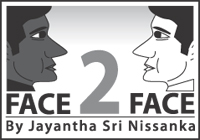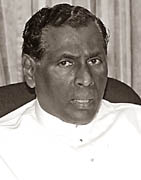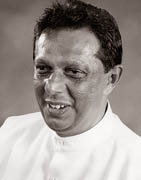|
observer |
|
|
|
|
|
OTHER LINKS |

|

|

|
John cohabits politically with John
Q: Is this the first time the UNP and SLFP struck a deal to address some national issues? Seneviratne: I think so. That is why it is historic and very encouraging. Amaratunga: Yes, as far as I know, this is the first time the two major parties joined hands to this magnitude to address national issues. In the past, the opposition might have occasionally supported the Government on an adhoc basis on few issues. But this is the first time the two major parties ceremonially are going to sign a MOU which is not just an agreement but a mechanism involved to implement the agreement. Q: Is this a move to form a national Government? Seneviratne: Well, I don’t say that exactly because a national government concept has not yet been approved by either party. What has been accepted is only a consensual Government where the two parties have agreed on a common agenda to solve some identified problem. So I believe everybody is expecting the two parties to get together because there was no much difference in the policies of two parties on the matter of ethnic, economic and many other issues. So these two parties without much difficulty can implement policies without any contradiction. Amaratunga: May be in time to come but certainly not immediately. This may be a stepping stone for a national government. Otherwise, the main Opposition party has given fullest cooperation to the government to implement their programme and policies. The question of a national government comes if we accept portfolios. At this stage we are not going to do it. First, we will work in Committees. Even the President hinted that he is prepared to concede some reasonable ministries. Q: People fear that this exercise will finally become a futile effort. Because they remember what happened during the 2000 Constitution proposals. Two years of talks ended when the UNP backed out. Will the UNP repeat it? Seneviratne: Well, our history teaches us certain lessons. When there is no equal enthusiasm from both sides, it will not work. I believe this time both parties from the very beginning displayed tremendous amount of enthusiasm due to the pressure from the society because people have suffered enough. People have seen so many attempts to address key issues but it had failed because there was no consensus between two major parties. This situation created by the strong will of the people forcing the two parties to get together for the purpose of converting Sri Lanka to a better place to live. Amaratunga: We never signed it. But this situation is different. The new agreement with this Government, there is an implementation programme attached to it. The MOU will be signed in ten days time. After that both sides will discuss how the Committees should function and their powers. Now there is enthusiasm on both sides as well as the two leaders in addition to all sections of the society. I am 100 percent certain there will be a substantial rise in the stock market. Q: Will the two parties try to checkmate each other because the UNP leader is good at political games? Seneviratne: The country is foremost more important than politics. Both parties have realised this. Such things will not occur. Amaratunga: There is nothing that he can do once the system is established and open. It has to function. No one can obstruct the process. We all are for this type of cooperation with the Government in order to make Sri Lanka a better place to live. Q: Rather than cohabitation, is this the only option for the UNP leader Ranil Wickremesinghe to keep his men under his fold because many UNP MPs are ready to crossover? Seneviratne: As I said earlier, they responded to the President’s invitation. They wanted to be a party to solve key national issues in the country which are even affecting the UNP. Amaratunga: The initiative came from the President and our leader responded positively as a responsible main Opposition political party in the country. Q: The SLFP is for the undivided country. The UNP is for a federal solution to the ethnic problem. If you arrive at a solution similar to federalism, what will be the balance of the government? Seneviratne: You know that our stance is to devolve maximum power possible and the UNP is also agreeable to devolve power too. We must examine how to do it. The matter has to be discussed. Whether it is a unitary or a united or some other word is not very much important. If we can find a solution. That is the best. If we intricate on words, we won’t be able to move forward. Amaratunga: The ultimate objective is to bring about a peaceful settlement to the North and East (N&E) problem. Words don’t matter very much whether it is federalism or maximum devolution. But we have to find a solution acceptable to both sides. Devolution of power is the order of the day. But we have to decide the degree of the devolution of power. Q: Some believe that the Government struck a deal with the UNP fearing that the UNP will defeat the coming budget. Is this a move to prevent the UNP action? Seneviratne: I don’t think that they have that idea of defeating us because the UNP itself is not ready for an election. We have been made to understand that the coming budget is a pro public budget and therefore no party can easily make up their mind to defeat it. In any case I am sure along with other parties, the JVP will support the budget because it is going to help the poor and the under privileged. It is also going to provide an economic impetus to economic development. How can such a budget be defeated? Amaratunga: After we sign the MOU, it is our responsibility to see the budget is through. That is the understanding. We have to be careful on our speeches. We should not unnecessarily criticize the Government because it can affect our cohabitation. But we have to make sure the budget proposals are for the benefit of the people. Q: What are the modalities in the final frame work? Seneviratne: Well, the two leaders will discuss the structure. They have to decided on principles to join together, work together and to decide whether the UNP will accept ministries. Amaratunga: That is what we are going to discuss. How many members in the Committees, how many will chair Committees, what will be the ministries, how to implement decisions of the committee, do they need a legal sanction, does it need Constitutional amendment, how is the reporting system to the Cabinet, what rights the Committee have to investigate or inquire into corruption and all other issues will be discussed in length. Q: Will the UNP accept ministries or otherwise what is the role of the UNP in the Committee system? Seneviratne: That is a matter for the UNP to decide. Amaratunga: May be, the arrangement is that 50% of chairmanships will be taken by the opposition and balance to the Government. Q: Does the consensus with the UNP mean that they have accepted Mahinda Chinthanaya? Seneviratne: We as a Government practically implement the Mahinda Chinthanaya. Other parties will accept the policy presented by Government. So, that will be a common programme. Amaratunga: Not necessarily. That is the Government Policy document but we only cooperate with the Government. Q: What is the final structure of the Committee system you are going to introduce? Is it similar to the Donoughmore system? Seneviratne: We talk of the Donoughmore system because the Committee system existed at that time. I find a vast difference between that committee system and the proposed system. At that time there were no political parties. Now the party system is in place and people divided on political parties. A strong executive Presidency is in place now. Executive powers under Article 4 of the Constitution are implemented through the Cabinet of Ministers. I believe every Member of Parliament can be a member in a committee and render his service to the country. Amaratunga: When we think of Committee system our mind goes back to Donoughmore system. Possibly we can adopt a system from Japan or Germany to operate the proposed Committee system. Q: Who will hold positions in proposed Committees, Ministers or some other members? Seneviratne: Ministers are also there. Every member will be a member of those committees. It is optional and no compulsion. Amaratunga: We will have equal status in this committee. We have to sort out whether the UNP will chair the Committees or a Minister is in charge of the subject. These matters we have to be discussed in detail. Q: How many committees will be introduced? Seneviratne: That depends on the number of Ministries. Each Ministry has a committee. Committee will be chaired by the Chairman or the Minister. The Deputy Minister will be the Vice Chairman. So any number of members can be members and they can contribute to development of that particular subject. Amaratunga: Each Ministry will have a Committee and all parliament members will work in those Committees. Q: How long will the UNP will operate in proposed Committees because as the main opposition party, their main aim is to came back to power? Seneviratne: Time alone will decide that. As a responsible political party in the country, I can’t think that they will sabotage this national endeavour. Amaratunga: We will maintain our identity. After the end of the due period there will be elections. Until then we will cooperate. Q: People blame that some politicians have robbed the nation. Will this Committees work to minimize bribery and corruption? Seneviratne: Now it is easy to monitor illegal practices since the Opposition is actively involved in the administration. This could certainly reduce the level of corruption in the Government institutions. Amaratunga: We will bring it to the notice of the President. Committees will have eye on corrupt politicians and officials. This is one way we can minimize corruption though we can’t eradicate it. We can now keep a tab on Ministers. |
 Q: Why did the UNP and the SLFP suddenly think of working in
cohabitation on key national issues?
Q: Why did the UNP and the SLFP suddenly think of working in
cohabitation on key national issues? Seneviratne: The UNP responded positively to President Mahinda
Rajapaksa’s invitation to join hands with the Government to find
solutions to key national issues which should have been addressed
decades ago. This situation arose because people expected the two major
parties to join hands on national issues over a period of time and to
stop playing politics. During the past several decades the country
suffered immensely because of the war. Apart from the war, there are so
many problems that have beset the country affecting the lives of the
people. Today, Sri Lanka is languishing far behind our neighbour
countries because there was no consistent implementation of development
plans due to politics because every new Government changed development
plans launched by the previous Government.
Seneviratne: The UNP responded positively to President Mahinda
Rajapaksa’s invitation to join hands with the Government to find
solutions to key national issues which should have been addressed
decades ago. This situation arose because people expected the two major
parties to join hands on national issues over a period of time and to
stop playing politics. During the past several decades the country
suffered immensely because of the war. Apart from the war, there are so
many problems that have beset the country affecting the lives of the
people. Today, Sri Lanka is languishing far behind our neighbour
countries because there was no consistent implementation of development
plans due to politics because every new Government changed development
plans launched by the previous Government. Amaratunga: This is a historic moment. A new political culture
has dawned thanks to President Rajapaksa who invited UNP leader Ranil
Wickremesinghe to join hands with his Government to address identified
national issues. Our leader without any hesitation accepted the
invitation for the benefit of the country and its people. We are
preparing to cooperate with the Government now. The two leaders on
Wednesday agreed to sign Memorandum of Understanding in the coming week
to implement this national requirement ending confrontational politics
and acrimonies. Because of this understanding, the economy will
experience a tremendous boost while ensuring a healthy democracy. We
should have done this decade ago. I am sure other minority parties too
will join us.
Amaratunga: This is a historic moment. A new political culture
has dawned thanks to President Rajapaksa who invited UNP leader Ranil
Wickremesinghe to join hands with his Government to address identified
national issues. Our leader without any hesitation accepted the
invitation for the benefit of the country and its people. We are
preparing to cooperate with the Government now. The two leaders on
Wednesday agreed to sign Memorandum of Understanding in the coming week
to implement this national requirement ending confrontational politics
and acrimonies. Because of this understanding, the economy will
experience a tremendous boost while ensuring a healthy democracy. We
should have done this decade ago. I am sure other minority parties too
will join us.






